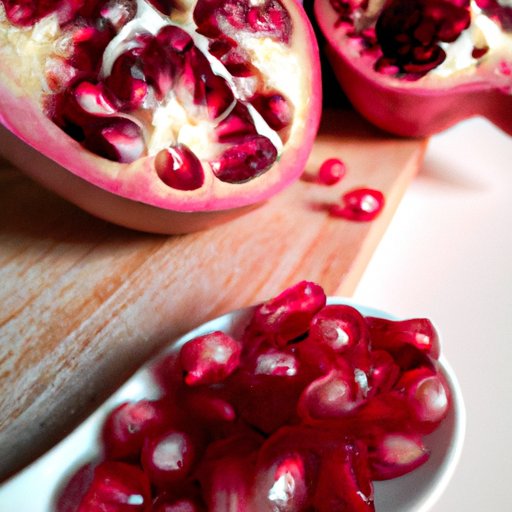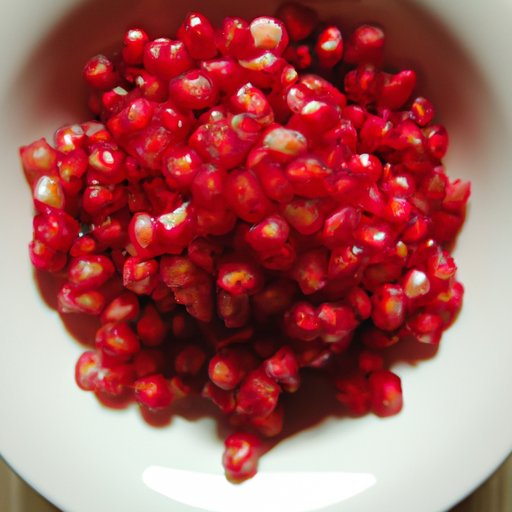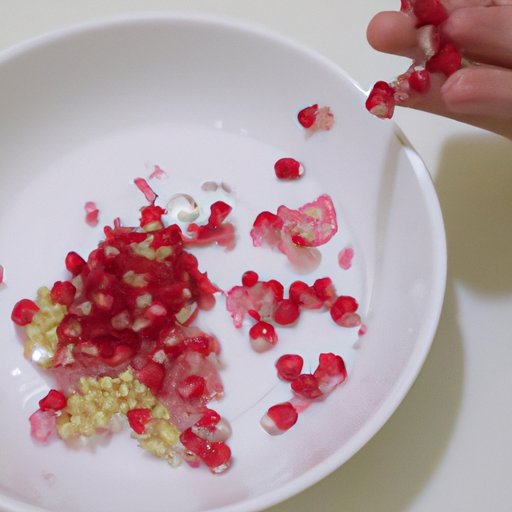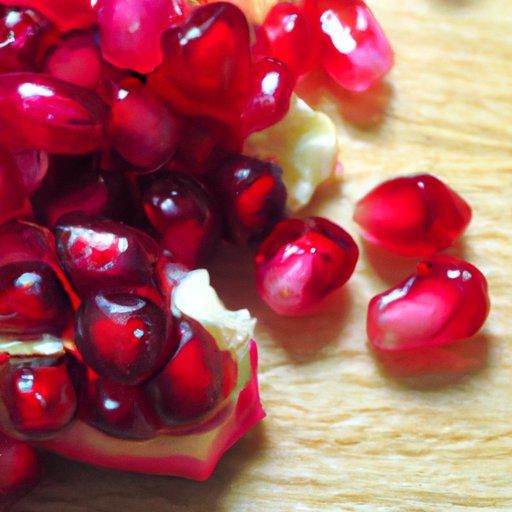Introduction
Pomegranates are a unique and flavorful fruit with a range of potential health benefits. While many people enjoy the juicy, sweet-tart flavor of the arils, or edible seeds, that make up the bulk of the fruit, some may be unsure whether they should eat the seeds. In this article, we’ll explore the potential benefits, risks, and tips for safely incorporating pomegranate seeds into your diet.
Overview of Pomegranate Seeds
The inside of a pomegranate consists of several chambers filled with juice sacs called arils. These arils contain the edible seeds of the pomegranate, which can range in color from light pink to dark red. The seeds have a crunchy texture and a sweet-tart flavor.

Benefits of Eating Pomegranate Seeds
Pomegranates are a rich source of antioxidants, vitamins, minerals, and fiber. Eating pomegranate seeds may provide a variety of health benefits, including reducing inflammation, lowering cholesterol, and preventing certain types of cancer.

Nutritional Benefits of Eating Pomegranate Seeds
Pomegranate seeds are full of essential nutrients that can benefit your health. Here are some of the key nutrients they contain:
Antioxidants
Pomegranate seeds are packed with antioxidants, which are compounds that help protect against cell damage caused by harmful molecules called free radicals. Studies suggest that antioxidants may reduce inflammation, lower cholesterol levels, and decrease your risk of developing certain types of cancer (1).
Vitamin C
Pomegranate seeds are a good source of vitamin C, an essential nutrient involved in wound healing, immune system function, and collagen production. Vitamin C is also an antioxidant, so it can help protect cells from damage (2).
Fiber
Pomegranate seeds are high in fiber, a type of carbohydrate that helps keep your digestive system healthy. Fiber can also help you feel full longer, which may aid in weight loss (3).
Potassium
Pomegranate seeds are also a good source of potassium, a mineral that helps regulate blood pressure, muscle contractions, and nerve signals. Adequate intake of potassium may also help prevent stroke and heart disease (4).
Examining the Health Risks of Eating Pomegranate Seeds
Although pomegranate seeds have many potential health benefits, there are some potential risks associated with eating them. Here are two potential risks to consider:
Choking Hazard
Pomegranate seeds can be a choking hazard, particularly for young children. To reduce the risk of choking, it’s important to peel and deseed the pomegranate before eating the arils (5).
Allergies
Some people may be allergic to pomegranate seeds. Symptoms of an allergic reaction can include itching, hives, swelling, difficulty breathing, and nausea. If you experience any of these symptoms after eating pomegranate seeds, seek medical attention immediately (6).

How to Safely Consume Pomegranate Seeds
If you’re interested in adding pomegranate seeds to your diet, here are some tips for safely consuming them:
Peel and Deseed
To reduce the risk of choking, it’s important to peel and deseed the pomegranate before eating the arils. This can be done by cutting the pomegranate in half and gently squeezing the halves over a bowl to release the seeds. Alternatively, you can use a spoon to scoop out the seeds.
Rinse and Dry
Once the seeds are removed from the pomegranate, rinse them with cold water and dry them with a paper towel. This will help remove any remaining bits of pulp or membrane, which can be bitter in taste.
Avoid Overconsumption
Pomegranate seeds are high in sugar, so it’s important to avoid overconsuming them. One serving of pomegranate seeds is ½ cup, which contains approximately 120 calories (7).
Tips for Incorporating Pomegranate Seeds into Your Diet
Pomegranate seeds can be enjoyed on their own as a snack or added to a variety of dishes. Here are some ideas for incorporating them into your diet:
Salads
Pomegranate seeds can add a burst of flavor to salads. Try adding them to your favorite salad for a sweet-tart crunch.
Smoothies
Pomegranate seeds can also be blended into smoothies for a nutritious and delicious drink. Simply add a handful of pomegranate seeds to your favorite smoothie recipe.
Granola
For a healthy breakfast or snack, try adding pomegranate seeds to homemade granola. The tart flavor of the seeds will balance out the sweetness of the granola.
Trail Mix
Pomegranate seeds can also be added to trail mix for a flavorful and nutritious snack. For a fun twist, try adding dried cranberries and pistachios to the mix.
Exploring the Unique Flavor and Texture of Pomegranate Seeds
The flavor and texture of pomegranate seeds make them a unique addition to any dish. Here’s what you can expect when you bite into one:
Sweet and Tart
Pomegranate seeds have a sweet-tart flavor, making them a great addition to both sweet and savory dishes. The sweetness of the seeds makes them a popular choice for desserts, while the tartness makes them a great addition to salads and other savory dishes.
Crunchy and Juicy
When you bite into a pomegranate seed, you’ll experience a crunchy texture followed by a burst of juicy flavor. This combination of crunchy and juicy makes pomegranate seeds a unique and enjoyable snack.
Conclusion
Pomegranate seeds can be a tasty and nutritious addition to your diet. They are high in antioxidants, vitamins, minerals, and fiber, and can provide a variety of potential health benefits. However, there are some potential risks associated with eating pomegranate seeds, such as choking and allergies, so it’s important to consume them safely. By peeling and deseeding the pomegranate, rinsing and drying the seeds, and avoiding overconsumption, you can enjoy the unique flavor and texture of pomegranate seeds without worrying about the risks.
(Note: Is this article not meeting your expectations? Do you have knowledge or insights to share? Unlock new opportunities and expand your reach by joining our authors team. Click Registration to join us and share your expertise with our readers.)
